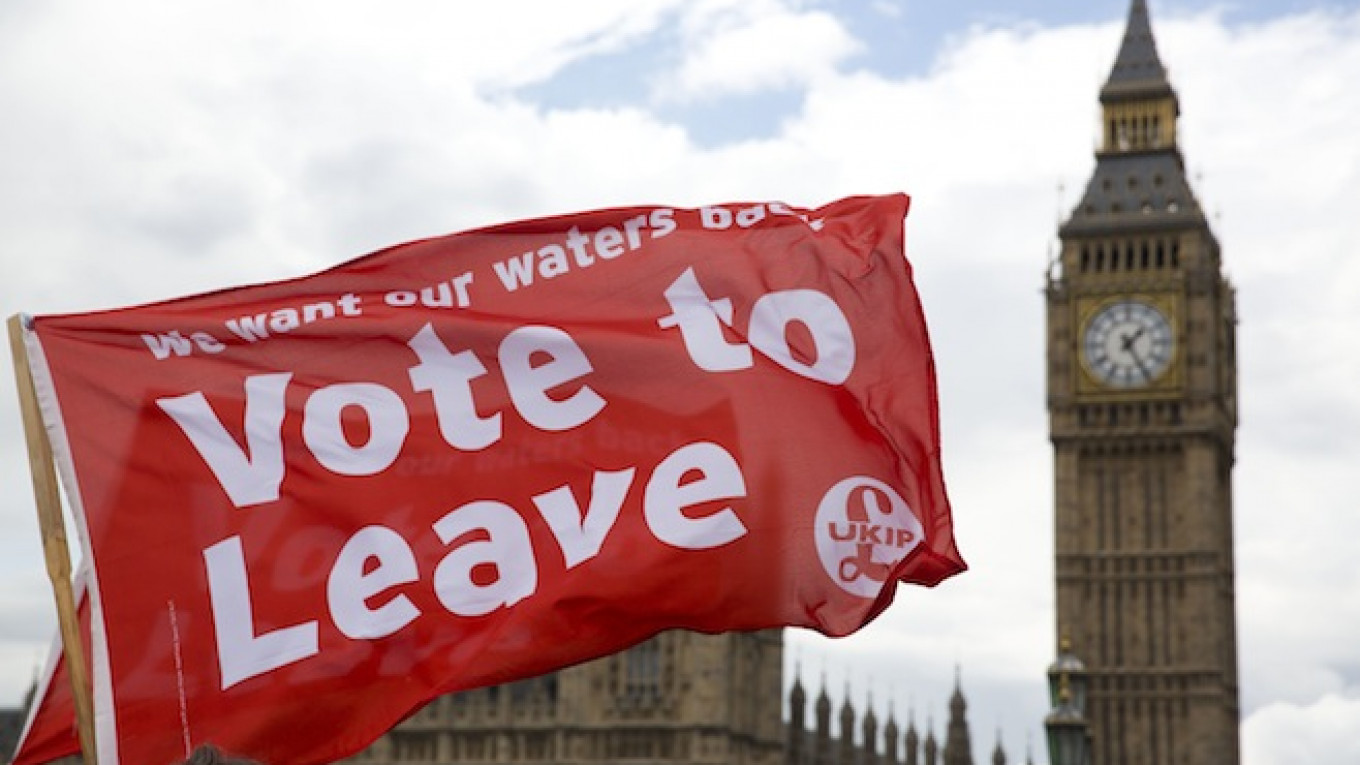According to official results released Friday, 52 percent of British voters voted for the U.K. to leave the European Union — the so-called Brexit.
Here is how Russia has reacted to the historical referendum.
Alexei Pushkov, head of the State Duma's foreign affairs committee, said EU countries will be against carrying out any further referendums after Brexit.
“After the referendum in the Netherlands and Britain, the European ruling elites will be against conducting them: Public opinion is dangerous for their political goals,” Pushkov? wrote on Twitter.
According to Andrei Klepach, deputy chairman of the Russian State Development Bank Vneshekonombank (VEB), the U.K. leaving the EU could, in the long term, lead to the return of investor interest in Russia.
“It [Brexit] destabilizes the euro and the European stock market, this would lead to disturbances in the markets of emerging markets,” Klepach was? quoted as saying? by the Interfax news agency.
“Amid that, we could have good potential for growth in the value of securities, taking into account the pricing environment for oil, and the fact that next year, Russia's economy, though slowly, will begin to grow,” he added.
The Russian Finance Ministry says Brexit does not bear serious risks for the Russian economy.
“This will of course reduce the appetite of investors to take risks. But I do not see any serious risks for Russia,” Deputy Finance Minister Alexei Moiseyev? told? the TASS news agency.?
The outspoken leader of Russia' s LDPR Party Vladimir Zhirinovsky called the decision of the British people “a great act of bravery.”
“Rural, provincial, working Britain said 'no' to the union, which has created by the financial mafia, globalists and all others,” Zhirinovsky was? quoted? by Interfax as saying.?
“Following Britain, NATO, Schengen and the euro will collapse. Long live the Russian ruble and the development of relations with all the democratic countries of Europe!” he added.
The mayor of Moscow Sergei Sobyanin? wrote on Twitter? that “Without the U.K., there will be nobody in the EU to defend sanctions against Russia so zealously.”?
According to state-run television channel? NTV, Russia tries not to interfere in the processes taking place in Europe, but it is impossible not to mention that many of the emerging issues are often easier to solve on a bilateral basis than to carry out such decisions through Brussels.
Head of the Federation Council's foreign affairs committee, Konstantin Kosachyov said the results of the referendum show that the EU failed “to fulfill its primary mission — to become transparent and convenient for citizens,” TASS? reported.
“Brexit doesn't significantly affect Russia. We have our problems, more sensitive ones,” former finance minister and current chairman of Russia's Center for Strategic Research Alexei Kudrin? wrote on Twitter.
He also predicted that both the EU and the U.K. will become weaker economically.
State Duma Deputy Sergei Zheleznyak called Brexit “an expected outcome of the Brussels bureaucracy policy.”
“The priority for them [European politics] should be the interests of their citizens, rather than Washington and the blurred, theoretical unification of Europe,” Zheleznyak? wrote on Facebook.?
“If Brussels does not immediately change its policy priorities, a series of referendums in other European countries, the marginalization and the collapse of the EU will become more and more real,” he added.
According to the Komsomolskaya Pravda newspaper, the United States blamed the referendum results on Russia. Former U.S. Ambassador to Russia Michael McFaul? said? that the election results were “a great victory” for President Vladimir Putin's foreign policy.?
"Not always, but tonight is giant victory for Putin's foreign policy objectives. Give him credit,” McFaul wrote on Twitter Thursday.
"Putin did not cause the outcome; he just benefited from it," McFaul? posted on Twitter? on Friday.?
Business ombudsman Boris Titov said that the long-term consequences of the referendum would separate Europe from the United States.
“This is not the independance of Britain from the European Union, it's the independance of the European Union from the United States,” he? wrote on Facebook.
In 10 years it will be possible to talk about a United Eurasia, he added.
A Message from The Moscow Times:
Dear readers,
We are facing unprecedented challenges. Russia's Prosecutor General's Office has designated The Moscow Times as an "undesirable" organization, criminalizing our work and putting our staff at risk of prosecution. This follows our earlier unjust labeling as a "foreign agent."
These actions are direct attempts to silence independent journalism in Russia. The authorities claim our work "discredits the decisions of the Russian leadership." We see things differently: we strive to provide accurate, unbiased reporting on Russia.
We, the journalists of The Moscow Times, refuse to be silenced. But to continue our work, we need your help.
Your support, no matter how small, makes a world of difference. If you can, please support us monthly starting from just $2. It's quick to set up, and every contribution makes a significant impact.
By supporting The Moscow Times, you're defending open, independent journalism in the face of repression. Thank you for standing with us.
Remind me later.


